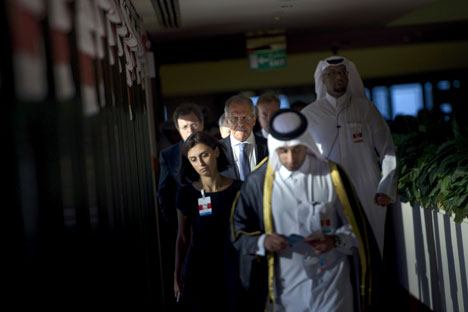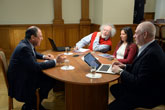Joint cooperation fails to evolve in Syria

The survival of Assad may not be an indispensable contending factor for parties to the conflict. What is more important is the likely situation after the ouster of Assad.
EPAA new dimension was recently added to the Syrian conflict with the US declaration that it would provide air support to rebels in Syria. While the emphasis was on fighting extremism, adding that air strikes would be used against any forces hostile to the rebels has expanded the scope of the air strikes, making it possible to use them against Bashar-al-Assad’s forces. Russia has opposed the US policy because it violates international law, and may cause further escalation of the chaos in the disturbed West Asia.
Russia has proposed a coalition of regional powers including Iraq, Syria and Turkey and anti-ISIS forces to fight terrorism. It also favours a UN supported framework for this purpose. The UN charter elaborates the role of the international body as a guarantor of international peace and security and empowers the Security Council to “determine the existence of any threat to the peace, breach of peace, or act of aggression,” to take “such action by air, sea, or land forces as may be necessary to maintain or restore international peace and security.” There are precedents in the recent past when the UN Security Council has adopted a resolution on the basis of a consensus to fight extremism. In October 2012 the UNSC passed resolution 2071, with the support of all the permanent members, including Russia and the US, to approve deployment of France-led international forces in Mali against extremist forces linked to Al Qaeda. However, the Security Council failed to evolve a consensus on fighting extremism in Syria.
There appear to be concerns beyond extremism, coloured by clashing geopolitical visions and strategic interests, which have hindered the development of a consensus among the key players. The Syrian crisis since 2011 has killed more than 200,000 people and displaced more than 11 million people. The scale of devastation prompted then UN Human Rights Commissioner, Navi Pillay to observe, “There will always be some disagreement within the international community on how to respond to a given situation; but when tens of thousands of civilian lives are threatened, as currently in Syria, the world expects the Security Council to unite and act.”
Due to geopolitical rivalries, numerous dialogues between the key players in Geneva and other places have failed to take shape. The conflict has witnessed the rapid rise of the ISIS and further destruction and loss of civilian life in the past four years.
Unless mutual understanding develops between the contending players, particularly the US and Russia, and their allies, the Syrian crisis would slide further into chaos. As Russian Foreign Minister Sergei Lavrov pointed out after his meeting with his US and Saudi counterparts earlier this week, the policy to support the rebels may prove “counterproductive.”
“We say that this position (air support to rebels) is a violation of international law and represents an obstacle on the road to forming a united front to fight terrorism, including Islamic State and al-Nusra Front,” Lavrov said. He also argued that the airstrikes would not be enough to root out the ISIS. There are instances that trained fighters have joined the ISIS. The survival of Assad may not be an indispensable contending factor for parties to the conflict. What is more important is the likely situation after the ouster of Assad. Syria lies in the fault line of the Shia-Sunni conflict.
Sunni authoritarian monarchies support a Sunni revival and toppling of Assad, and in this effort they are keen to enlist the support of the US. Russia is interested in a transition, but would prefer a peaceful transition and opposes the forcible ouster of Assad. It would prefer a solution through international mediation. Lavrov appealed to his US and Saudi counterparts to evolve a joint framework and told journalists, “I hope that these gentlemen offer their assistance (in resolving the Syrian crisis).”
The Syrian crisis is more than the issue of regime change or sectarian clashes. The location of Syria, and its proximity to Israel, and its access to Mediterranean Sea, and its resources make it an ideal candidate for geopolitical rivalry in West Asia.
According to a scholar on West Asia, “…the Arab world and the wider Middle East theatre remains a hostage of mega-geopolitical and geo-economic chess-board drama. One thing is certain, if anything springs from the Arab soil, it is the oil. Everything else is (still) up in the (roaring) air.”
Any attempt to force a resolution of the crisis, which has failed so far, would further complicate the situation. The question is how to evolve an agreeable framework that addresses the concerns of all parties including the authoritarian monarchies of the Gulf, Syria, Iraq, Iran, and Russia and the US.
The Qatari foreign minister echoed Lavrov when he said, “Qatar and Russia agree that the solution to the Syrian crisis should be a political one accepted by the Syrian people.” It is perhaps the most crucial time that Russia’s proposal for the creation of a united front comprising the regional powers including Iraq and Syria and anti-IS forces taken seriously.
Violence has failed as a means of conflict resolution in Syria. It is time that a peaceful strategy is devised; otherwise the conflict will be further protracted, and turned into a site of geopolitical rivalries with accompanying humanitarian disaster, with wider ramifications for West Asia and the world
All rights reserved by Rossiyskaya Gazeta.
Subscribe
to our newsletter!
Get the week's best stories straight to your inbox

